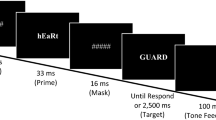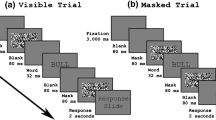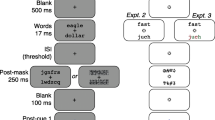Abstract
Mixed-case WoRdS disrupt performance in word recognition tasks and sentence reading. There is, however, a controversial issue around this finding as the hindered performance could be related to impoverished lexico-semantic access or to lack of visual familiarity. The present experiments aim to examine whether there is a genuine mixed-case effect during lexico-semantic access or whether the effect is driven by a visual familiarity bias (i.e., lack of familiarity may induce a bias toward “no” responses in word/nonword decisions). Participants were presented with same-case vs. mixed-case items in a word/nonword discrimination task (lexical decision) and in a task that requires access to semantic information (semantic categorization). In lexical decision, responses were faster and more accurate to same-case words than to mixed-case words, whereas the nonwords showed the opposite pattern. In two semantic categorization experiments, we failed to find any signs of a case-mixing effect for words. Therefore, the case-mixing effect in word recognition is not due to an impoverished access to lexico-semantic information but rather to lack of visual familiarity.
Similar content being viewed by others
Notes
What we should also note is that there is ERP evidence that N170 amplitude is sensitive to case mixing (Lien, Allen, & Crawford, 2012), and this may be taken as an early signature of case-mixing. However, as Perea et al. (2015) noted, “it is difficult to make strong inferences on the connection between this early, perceptual ERP effect and lexical access” (p. 42).
We thank Ken Forster for suggesting this explanation.
References
Allen, P. A., Wallace, B., & Weber, T. A. (1995). Influence of case type, word frequency, and exposure duration on visual word recognition. Journal of Experimental Psychology: Human Perception and Performance, 21, 914–934. https://doi.org/10.1037/0096-1523.21.4.914.
Baayen, R. H. (2008). Analyzing linguistic data: A practical introduction to statistics using R. Cambridge: Cambridge University Press.
Bates, D., Maechler, M., Bolker, B., & Walker, S. (2015). Fitting linear mixed-effects models using lme4. Journal of Statistical Software, 67, 1–48. https://doi.org/10.18637/jss.v067.i01.
Besner, D. (1983). Basic decoding components in reading: Two dissociable feature extraction processes. Canadian Journal of Psychology, 37, 429–438. https://doi.org/10.1037/h0080739.
Besner, D., & McCann, R. S. (1987). Word frequency and pattern distortion in visual word identification and production: An examination of four classes of models. In M. Coltheart (Ed.), Attention and performance XII: The psychology of reading (pp. 201–219). Hove: Erlbaum.
Blais, C., & Besner, D. (2005). When the visual format of the color carrier word does and does not modulate the Stroop effect. Memory & Cognition, 33, 1337–1344. https://doi.org/10.3758/bf03193366.
Brysbaert, M., Mandera, P., & Keuleers, E. (2017). The word frequency effect in word processing: An updated review. Current Directions in Psychological Science, 27, 45–50. https://doi.org/10.1177/0963721417727521.
Duchon, A., Perea, M., Sebastián-Gallés, N., Martí, A., & Carreiras, M. (2013). EsPal: One-stop shopping for Spanish word properties. Behavior Research Methods, 45, 1246–1258. https://doi.org/10.3758/s13428-013-0326-1.
Forster, K. I. (1998). The pros and cons of masked priming. Journal of Psycholinguistic Research, 27, 203–233. https://doi.org/10.1023/A:1023202116609.
Forster, K. I., & Davis, C. (1984). Repetition priming and frequency attenuation in lexical access. Journal of Experimental Psychology: Learning, Memory, and Cognition, 10, 680–698. https://doi.org/10.1037/0278-7393.10.4.680.
Forster, K. I., & Forster, J. C. (2003). DMDX: A Windows display program with millisecond accuracy. Behavior Research Methods, Instruments, & Computers, 35, 116–124. https://doi.org/10.3758/s13428-014-0493-8.
Frederiksen, J. R. (1978). Assessment of lexical decoding and lexical skills and their relation to reading proficiency. In A. M. Lesgold, J. W. Pellegrino, S. D. Fokkema & R. Glaser (Eds.), Cognitive psychology and instruction (pp. 153–169). New York: Plenum Press.
Houston, J. R., Rossmiller, A. C., & Allen, P. A. (2016). Case mixing does not modulate the Stroop effect. Poster presented at the 2016 Midwestern Psychological Association Annual Conference, Chicago, IL.
Humphreys, G. W., Mayall, K., & Cooper, A. C. G. (2003). The PIG in sPrInG: Evidence on letter grouping from the reading of buried words. Psychonomic Bulletin & Review, 10, 939–946. https://doi.org/10.3758/bf03196555.
Keuleers, E., & Brysbaert, M. (2010). Wuggy: A multilingual pseudoword generator. Behavior Research Methods, 42, 627–633. https://doi.org/10.3758/brm.42.3.627.
Kinoshita, S. (1987). Case alternation effect: Two types of word recognition? Quarterly Journal of Experimental Psychology, 39A, 701–720. https://doi.org/10.1080/14640748708401810.
Kinoshita, S., & Norris, D. (2010). Does the familiarity bias hypothesis explain why there is no masked priming for “NO” decisions? Memory & Cognition, 39, 319–334. https://doi.org/10.3758/s13421-010-0021-8.
Kuznetsova, A., Brockhoff, P. B., & Christensen, R. H. B. (2017). lmerTest Package: Tests in Linear Mixed Effects Models. Journal of Statistical Software, 82, 1–26. https://doi.org/10.18637/jss.v082.i13.
Lavidor, M., Ellis, A. W., & Pansky, A. (2002). Case alternation and length effects in lateralized word recognition: Studies of English and Hebrew. Brain and Cognition, 50, 257–271. https://doi.org/10.1016/s0278-2626(02)00508-0.
Lee, C. H., Honig, R., & Lee, Y. (2002). Phonological recoding of mixed-case words in the priming task. Reading Psychology, 23, 199–216. https://doi.org/10.1080/02702710290061328.
Lien, M. C., Allen, P. A., & Crawford, C. (2012). Electrophysiological evidence of different loci for case-mixing and word frequency effects in visual word recognition. Psychonomic Bulletin & Review, 19, 677–684. https://doi.org/10.3758/s13423-012-0251-9.
Mayall, K., & Humphreys, G. W. (1996). Case mixing and the task-sensitive disruption of lexical processing. Journal of Experimental Psychology: Learning, Memory, and Cognition, 22, 278–294. https://doi.org/10.1037/0278-7393.22.2.278.
Mayall, K., Humphreys, G. W., & Olson, A. (1997). Disruption to word or letter processing? The origins of case-mixing effects. Journal of Experimental Psychology: Learning, Memory, and Cognition, 23, 1275–1286. https://doi.org/10.1037/0278-7393.23.5.1275.
Miozzo, M., & Caramazza, A. (2003). When more is less: A counterintuitive effect of distractor frequency in the picture-word interference paradigm. Journal of Experimental Psychology: General, 132, 228–252. https://doi.org/10.1037/0096-3445.132.2.228.
Perea, M., Jiménez, M., Talero, F., & López-Cañada, S. (2015). Letter-case information and the identification of brand names. British Journal of Psychology, 106, 162–173. https://doi.org/10.1111/bjop.12071.
Perea, M., Marcet, A., & Vergara-Martínez, M. (2018). Are you taking the fastest route to the RESTAURANT? The role of the usual letter-case configuration of words in lexical decision. Experimental Psychology, 65, 98–104. https://doi.org/10.1027/1618-3169/a000391.
Perea, M., Rosa, E., & Marcet, A. (2017). Where is the locus of the lowercase advantage during sentence reading? Acta Psychologica, 177, 30–35. https://doi.org/10.1016/j.actpsy.2017.04.007.
Perea, M., Vergara-Martínez, M., & Gomez, P. (2015). Resolving the locus of cAsE aLtErNaTiOn effects in visual word recognition: Evidence from masked priming. Cognition, 142, 39–43. https://doi.org/10.1016/j.cognition.2015.05.007.
Peressotti, F., Cubelli, R., & Job, R. (2003). On recognizing proper names: The orthographic cue hypothesis. Cognitive Psychology, 47, 87–116. https://doi.org/10.1016/S0010-0285(03)00004-5.
Quinn, W. M., & Kinoshita, S. (2008). Congruence effect in semantic categorization with masked primes with narrow and broad categories. Journal of Memory and Language, 58, 286–306. https://doi.org/10.1016/j.jml.2007.03.004.
R Development Core Team. (2018). R: A language and environment for statistical computing. Vienna: R Foundation for Statistical Computing.
Reichle, E. D., Pollatsek, A., Fisher, D. L., & Rayner, K. (1998). Toward a model of eye movement control in reading. Psychological Review, 105, 125–157. https://doi.org/10.1037/0033-295x.105.1.125.
Reichle, E. D., Tokowicz, N., Liu, Y., & Perfetti, C. A. (2011). Testing an assumption of the E-Z Reader model of eye-movement control during reading: Using event-related potentials to examine the familiarity check. Psychophysiology, 48, 993–1003. https://doi.org/10.1111/j.1469-8986.2011.01169.x.
Reingold, E. M., & Rayner, K. (2006). Examining the word identification stages hypothesized by the E-Z Reader model. Psychological Science, 17, 742–746. https://doi.org/10.1111/j.1467-9280.2006.01775.x.
Reingold, E. M., Yang, J., & Rayner, K. (2010). The time course of word frequency and case alternation effects on fixation times in reading: Evidence for lexical control of eye movements. Journal of Experimental Psychology: Human Perception and Performance, 36, 1677–1683. https://doi.org/10.1037/a0019959.
Smith, F. (1969). Familiarity of configuration vs. discriminability of features in the visual identification of words. Psychonomic Science, 14, 261–263. https://doi.org/10.3758/bf03329112.
Smith, R., Lott, D., & Cronnell, B. (1969). The effect of type size and case alternation on word identification. American Journal of Psychology, 82, 248–253. https://doi.org/10.2307/1421250.
Twomey, T., Kawabata Duncan, K. J., Hogan, J. S., Morita, K., Umeda, K., Sakai, K., et al. (2013). Dissociating visual form from lexical frequency using Japanese. Brain and Language, 125, 184–193. https://doi.org/10.1016/j.bandl.2012.02.003.
Wimmer, H., Ludersdorfer, P., Richlan, F., & Kronbichler, M. (2016). Visual experience shapes orthographic representations in the visual word form area. Psychological Science, 27, 1240–1248. https://doi.org/10.1177/0956797616657319.
Funding
The research reported in this article has been partially supported by Grants PSI2014-53444-P (Manuel Perea), PSI2017-86210-P (Manuel Perea), and BES-2015-07414 (Ana Marcet) from the Spanish Ministry of Economy and Competitiveness.
Author information
Authors and Affiliations
Corresponding author
Ethics declarations
Conflict of interest
The authors declare that they have no conflict of interest.
Ethical approval
The procedures involving human participants in this study were approved by the Experimental Research Ethics Committee of the Universitat de València and they were in accordance with the Declaration of Helsinki. All individuals provided written informed consent before starting the experimental session.
Electronic supplementary material
Below is the link to the electronic supplementary material.
Rights and permissions
About this article
Cite this article
Perea, M., Fernández-López, M. & Marcet, A. Does CaSe-MiXinG disrupt the access to lexico-semantic information?. Psychological Research 84, 981–989 (2020). https://doi.org/10.1007/s00426-018-1111-7
Received:
Accepted:
Published:
Issue Date:
DOI: https://doi.org/10.1007/s00426-018-1111-7




